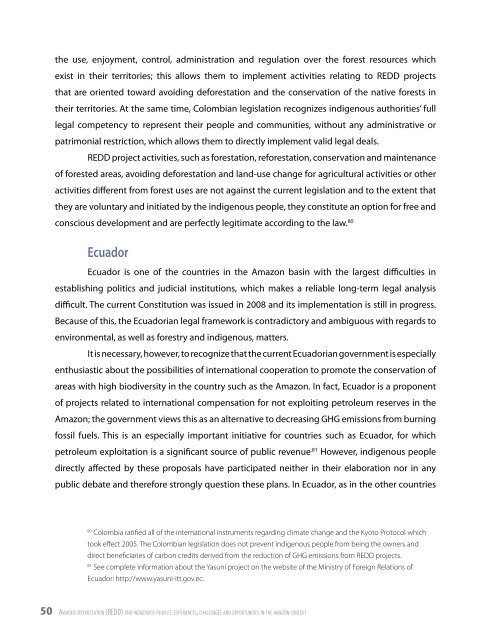Avoided Deforestation (REDD) and Indigenous ... - Amazon Fund
Avoided Deforestation (REDD) and Indigenous ... - Amazon Fund
Avoided Deforestation (REDD) and Indigenous ... - Amazon Fund
You also want an ePaper? Increase the reach of your titles
YUMPU automatically turns print PDFs into web optimized ePapers that Google loves.
the use, enjoyment, control, administration <strong>and</strong> regulation over the forest resources which<br />
exist in their territories; this allows them to implement activities relating to <strong>REDD</strong> projects<br />
that are oriented toward avoiding deforestation <strong>and</strong> the conservation of the native forests in<br />
their territories. At the same time, Colombian legislation recognizes indigenous authorities’ full<br />
legal competency to represent their people <strong>and</strong> communities, without any administrative or<br />
patrimonial restriction, which allows them to directly implement valid legal deals.<br />
<strong>REDD</strong> project activities, such as forestation, reforestation, conservation <strong>and</strong> maintenance<br />
of forested areas, avoiding deforestation <strong>and</strong> l<strong>and</strong>-use change for agricultural activities or other<br />
activities different from forest uses are not against the current legislation <strong>and</strong> to the extent that<br />
they are voluntary <strong>and</strong> initiated by the indigenous people, they constitute an option for free <strong>and</strong><br />
conscious development <strong>and</strong> are perfectly legitimate according to the law. 80<br />
Ecuador<br />
Ecuador is one of the countries in the <strong>Amazon</strong> basin with the largest difficulties in<br />
establishing politics <strong>and</strong> judicial institutions, which makes a reliable long-term legal analysis<br />
difficult. The current Constitution was issued in 2008 <strong>and</strong> its implementation is still in progress.<br />
Because of this, the Ecuadorian legal framework is contradictory <strong>and</strong> ambiguous with regards to<br />
environmental, as well as forestry <strong>and</strong> indigenous, matters.<br />
It is necessary, however, to recognize that the current Ecuadorian government is especially<br />
enthusiastic about the possibilities of international cooperation to promote the conservation of<br />
areas with high biodiversity in the country such as the <strong>Amazon</strong>. In fact, Ecuador is a proponent<br />
of projects related to international compensation for not exploiting petroleum reserves in the<br />
<strong>Amazon</strong>; the government views this as an alternative to decreasing GHG emissions from burning<br />
fossil fuels. This is an especially important initiative for countries such as Ecuador, for which<br />
petroleum exploitation is a significant source of public revenue .81 However, indigenous people<br />
directly affected by these proposals have participated neither in their elaboration nor in any<br />
public debate <strong>and</strong> therefore strongly question these plans. In Ecuador, as in the other countries<br />
80 Colombia ratified all of the international instruments regarding climate change <strong>and</strong> the Kyoto Protocol which<br />
took effect 2005. The Colombian legislation does not prevent indigenous people from being the owners <strong>and</strong><br />
direct beneficiaries of carbon credits derived from the reduction of GHG emissions from <strong>REDD</strong> projects.<br />
81 See complete information about the Yasuni project on the website of the Ministry of Foreign Relations of<br />
Ecuador: http://www.yasuni-itt.gov.ec.<br />
50 Av o i d e d d e f o re s t A t i o n (redd) A n d i n d i g e n o u s p e o p l e s: experiences, chAllenges A n d o p p o r t u n i t i e s in t h e A m A zo n c o n t e x t
















